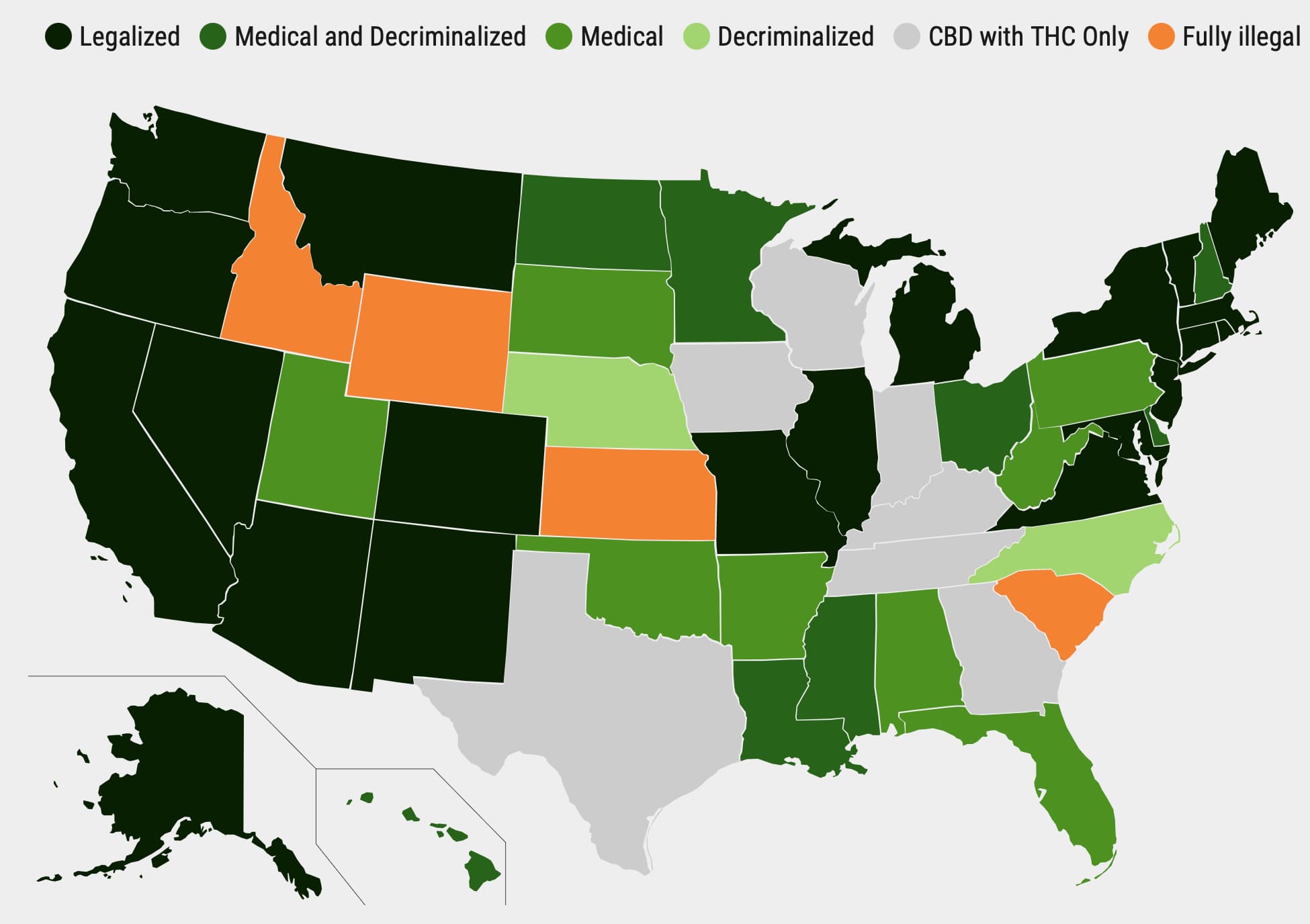Medical Marijuana Card Pros and Cons: Is MMJ Right For You?
While the US federal government appears to be moving, albeit slowly, towards the legalization of cannabis, we’re still some way off from this epic reversal.
However, with over 60% of states now offering medical marijuana programs in some form or the other, there is already an immediate solution for many patients in need of relief.
In California, one of the most relaxed states when it comes to cannabis policy, I still choose to be an MMJ cardholder because the benefits are simply worth the annual renewal fees.
Keep reading these medical marijuana pros and cons to decide if an MMJ card is the right option for you.
How Can You Get A Medical Marijuana Card?
Your state laws will determine exactly how you can get a medical marijuana card.
Generally, you can expect to consult with a licensed physician to get a certification. This person may or may not be your primary care physician.
They will speak with you about your medical history and conditions. The goal will be to determine if your condition can benefit from access to a medical marijuana card.
Depending on your state, you may need to provide a copy of your medical records. You may also need to provide certain documentation like X-rays or MRIs.
Be aware that some physicians are more willing to prescribe MMJ than others.
If you have concerns about speaking with your healthcare provider, don’t worry. You can meet with a physician online to get a medical marijuana recommendation.
- Apply within 10 minutes!
- Connect with a board certified physician
- Your money back if you’re unsuccessful with your application
Board-Certified Online Physicians
Thankfully, telehealth providers exist that simplify the process.
Now you can get your medical marijuana card without leaving home. And you may be able to avoid costly walk-in appointments too.
Leafwell and Veriheal are two excellent medical marijuana telehealth providers. They make getting a medical marijuana card fast and economical.
For a relatively small fee, you can connect with a board-certified physician from your computer. They both also offer a money-back guarantee if you are unable to get your medical marijuana card.
Once a physician issues your MMJ certification, you can apply for your MMJ card. You might need to apply through your state website to receive the card; after your online appointment of course.
You can expect to receive your card shortly after approval. You can then purchase cannabis from any legal dispensary.
Note – some states will allow you to purchase without the card itself while awaiting delivery, and medical marijuana users can also purchase via online delivery in some states.
Related Reads: Leafwell Review, Veriheal Review
Consequences of Getting a Medical Card
Most patients agree that the benefits of having a medical marijuana card far outweigh any consequences.
However, it’s essential to know exactly what these are, as some people may find one or more of the consequences unacceptable.
The two most controversial issues include a firearm restriction for MMJ users and a ban on holding a commercial driving license.
Note, if your place of employment implements drug testing you may be at risk of being fired, even in medical states. Very few states offer any employment protections for MMJ patients.
Federally, there is no difference between recreational cannabis use and cannabis use for medical purposes.
Related Reads: Medical and Recreational Marijuana Compared, MMJ Travel
Medical Marijuana Pros & Cons In 2024
More than two-thirds of the United States has a medical marijuana program.
Conflicting information between the federal and state laws has many wondering if it is a good idea to get a medical cannabis card.
To find out you have to weigh the pros and cons and decide for yourself.

Medical Marijuana Card Pros
Getting your medical marijuana card is the only way you can meet with a licensed physician to discuss your cannabis needs. They are the best people to help you find a treatment plan that is most suited for your medical condition(s).
They will take a look at your symptoms, lifestyle, and goals to assess your specific situation. They can then tell you what kind of products, strains, and dosages might help best.
Keep reading for our complete analysis of MMJ card pros.
1. State-Level Legal Protection
Cannabis is still considered an illegal drug in some states. In these instances, medical marijuana use is often the only way to lawfully consume cannabis.
Consuming cannabis in these states without a card can leave you facing serious penalties. These include both fines and imprisonment.
For example, in Louisiana, using marijuana without an MMJ card can land you up to 10 years of jail time. You can also rack up to $50,000 worth of fines.
No one should take these types of risks when there is a way to avoid them. Getting your medical marijuana card will give you immediate legal protection.
2. MMJ Is Less Expensive
Medical marijuana is less expensive to buy as it has lower state-level taxes.
This was an amazing realization for me as a first-time patient. I thought medical marijuana would be more expensive compared to recreational use products.
However, I soon discovered that purchasing medical marijuana was saving me money. The higher quality of the products also meant I could use less, so I didn’t need to buy more as often. And when I did purchase more products, I spent less on taxes.
All in all, one of the best pros of medical marijuana cards.
So far in 2022, 11 states have established legal markets for recreational cannabis.
They set their own sales taxes and excise taxes. Some states make it simple and impose no, or low taxes.
Some states have excise taxes that are similar to the ones on cigarettes. Cities and counties can charge additional local taxes as well.
Washington’s excise tax is an insane 37%. Add to this 6.5% in-state sales tax and up to 3.9% in local sales tax, and you end up paying up to 47.4% in taxes.
This is a huge difference from Washington’s impositions on medical marijuana buyers. Their purchases are exempt from taxes.
Here are the rest of the states that don’t impose any taxes on medical marijuana sales:
- Vermont
- Utah
- Pennsylvania
- Oregon
- Minnesota
- Massachusetts
- Maryland
- Louisiana
- Alaska
3. Increased Potency
Medical marijuana patients need to pay particular attention to the dosage of their medication. This is critical for marijuana patients to achieve the right outcome.
Medical dispensaries follow state medical marijuana laws. Their regulations may be different from recreational ones.
They usually carry products that are higher in potency. This is a significant benefit for medical cannabis users as it can increase cost-effectiveness and efficiency.
In most states regulations limit recreational dispensaries to lower cannabinoid levels.
In some states, medical dispensaries can double the cannabinoids in their products. Because of this, there are more options for products with a high CBD to THC ratio.
4. Access to Medical Only Dispensaries
Having an MMJ card can get you some exclusive cannabis options.
There are medical dispensaries that only serve MMJ cardholders, even if they operate where cannabis is recreationally legal.
For example, while I live in a state with a recreational program, I find medical marijuana the best option. I don’t have to worry about the transparency of what I am buying or consuming.
Cannabis from a medical dispensary follows strict regulations and testing. You can read the product information to find dosage amounts.
The products are normally of a higher quality than what is available recreationally. So I can take less and get a better result.
5. Higher Possession Limits
State laws determine how much marijuana recreational users can possess if any. Medical marijuana users typically have higher possession limits, allowing them to carry more cannabis than recreational users.
Many states with a medical marijuana program do not impose possession limits either. They just suggest the amount be consistent with patient needs.
This makes it easy to pick up your medication infrequently. You can refill your prescription on an expected schedule. You don’t have to worry about running out.
This is helpful for busy medical users who don’t want to stress over frequent dispensary trips nor unnecessary court dates. Recreational users can face steep fines and even jail time for possessing more than their state laws allow for.
6. Buy When 18+ Not 21+
States with recreational cannabis use permit access to people aged 21 or older. Some states allow medical marijuana patients to buy MMJ at the age of 18.
Many of the states with an MMJ program will even allow minors to use an MMJ card. They will need the approval of a parent or guardian in addition to their prescribing doctor.
7. Larger Access To Growing Weed
Being a medical marijuana cardholder may mean that you can grow your own cannabis. Not every state allows cultivation, but lots do.
If your state allows recreational cannabis cultivation, it still helps to have your medical marijuana card. It often allows you to grow more marijuana than those growing it for recreational use.
These state laws vary greatly. Some allow for people to grow up to six plants, like Alaska.
Arizona allows medical marijuana cardholders to grow up to 12 plants within one household.
Growing marijuana over state limits is punishable by a fine and jail time. Make sure you visit your local state website to double-check what applies to your region.
Medical Marijuana Card Cons
Having a medical marijuana card makes access to quality cannabis products much easier. But it does come with some cons that might deter some people from getting theirs.
Marijuana use is still federally prohibited. This leaves a large gray area when it comes to medical marijuana programs.
Many different spheres still consider marijuana to be an illicit drug. This means despite state laws they have a zero-tolerance policy for marijuana use.
1. Cannot Own A Firearm
It is illegal to own a firearm if you have a medical marijuana card.
Anyone who uses marijuana is unlawfully using a controlled substance from federal standards.
This applies even to medical marijuana cardholders. Even if they comply with state medical marijuana laws.
Therefore, it is illegal to own or purchase a firearm or ammunition.
Thanks to the 2018 Farm Bill this does not apply to patients who only use hemp-derived CBD products. Since CBD is not classified as a controlled substance by the federal government it is legal.
2. Banned From Holding A Commercial Driver’s License
The Federal Motor Carrier Safety Regulations view medical marijuana use no differently than recreational marijuana use.
Marijuana is classified as a Schedule 1 substance by the federal government. So using it for medical reasons will physically disqualify drivers from holding a commercial driver’s license.
Substances that are disqualifying might affect focus and reaction time. Even with valid prescription medication, you will be disqualified with a safety concern.
3. Renewal Fees
Medical Marijuana cards do expire.
States explain that this is because they want to ensure the medical marijuana program is used responsibly and continues to meet patient needs.
You will need to renew your card depending on your state’s timeline. The process is usually pretty straightforward. Patients who buy and renew their cards online usually pay annual renewal fees.
You may need to renew your card at least 30 days before it expires. Schedule your evaluation with enough time to satisfy your state guidelines.
Bring your medical records, state ID, and original medical marijuana card to make the process go quickly. The physician should ask some new questions about your current health. They may also ask how MMJ helps your condition.
They may outline a new treatment plan for you or talk about any side effects you might have experienced. With this information, they will decide whether to renew your card or not.
4. Zero Tolerance In Government Jobs
Government positions have a zero-tolerance policy when it comes to consuming cannabis. It does not matter what qualifying conditions you have.
This has been the case since Ronald Reagan established an Executive Order for a Drug-Free Federal Workplace. It states that people who use marijuana are unsuitable for federal employment.
This covers positions in any of the 3 branches of the US government. This also includes:
- Military service members
- Postal service workers
- Politicians
- The FBI
5. Red Tape In Some States
Some states make it more difficult to access medical marijuana than others. These states may have fewer qualifying conditions. Or they may have more requirements to get your medical marijuana card.
They may also make it difficult for producers to grow and sell cannabis products.
There might also be a lack of board-certified physicians who can provide a medical marijuana recommendation. Some states have less than 100 physicians causing a bottleneck for patients waiting to apply to their state.
Physicians have to work in specific ways to make sure they are following legal protocols. This is why medical doctors can only make a recommendation in the first place.
Physicians who prescribe medical marijuana to patients can have their DEA licensure revoked too. This is because it can be considered aiding and abetting the acquisition of marijuana.
Instead of prescribing cannabis, they can make a recommendation for the patient. Then the patient is left to apply to their state. Whether the red tape is making it hard on patients, distributors, or physicians, it limits access to medication.
Avoiding these bureaucratic issues is easier now that you can go online for fast and affordable service. You can get your MMJ recommendation and apply for your state card in as little as 30 minutes.
If your state does not yet allow this type of online service, check back periodically. These platforms are waiting to update their services. They plan to add more states as soon as they legalize marijuana for medical use.
- Seamlessly connect with a physician via Veriheal telehealth
- One simple fee
- Approved for MMJ or your money back!
Wrapping Up MMJ Pros and Cons
Getting a medical marijuana card can be a good idea even if there is recreational legalization in your state.
If you have a qualifying condition it can unlock certain benefits that recreational users have to go without.
It is also the best way to consult with a medical professional that can guide you to the best treatment. And, you may even be able to grow marijuana plants at home.
In my opinion, the pros that come with getting a medical marijuana card outweigh the cons of being a cardholder.
If you are ready to pursue a medical card in your state, hit up Leafwell or Veriheal for a recommendation.



